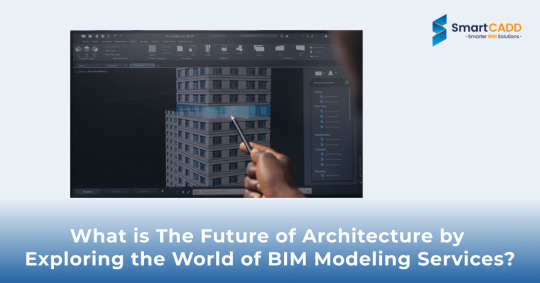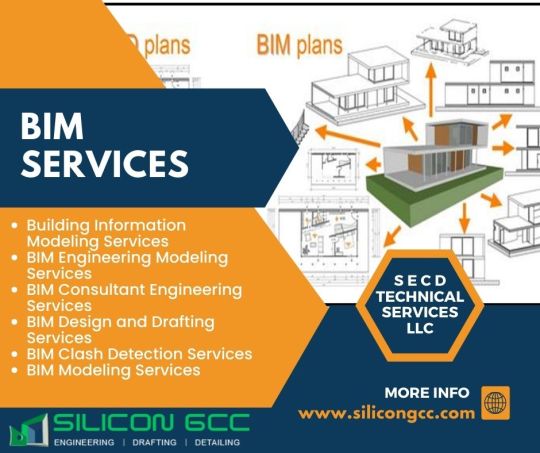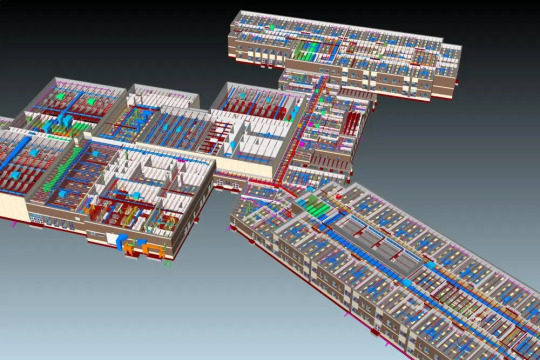#BIM Model Coordination
Text
How Bim Modeling Empowers Contractors To Deliver On Time And Within Budget
Building Information Modeling (BIM) stands as a revolutionary approach that transcends traditional two-dimensional blueprints. It is a sophisticated process that utilizes digital representations of the physical and functional characteristics of the place to facilitate efficient construction and effective project management. BIM is not merely about creating 3D models; It’s about centralizing information, fostering collaboration, and streamlining the entire construction lifecycle. If you live in New York and are searching for the best consultants and BIM detailers in New York , then go for Agon. From optimizing project management to ensuring ongoing facility maintenance, Agon is at the forefront of revolutionizing the experience throughout the construction process. To know more visit us at: https://writethepost.com/how-bim-modeling-empowers-contractors-to-deliver-on-time-and-within-budget/

1 note
·
View note
Text
Are Building Information Modeling Companies involved in sustainable design?
In the world of federal projects, efficiency, accuracy, and collaboration are paramount. At Modulus Consulting, we understand the unique challenges and demands of federal BIM initiatives. With a passion for innovation and a dedication to excellence, we're leading the charge in revolutionizing the BIM process. Join us as we explore how Modulus Consulting is reshaping the landscape of federal BIM projects, leveraging cutting-edge technology and expertise to deliver superior results.
0 notes
Text
Seamless Project Success with MEP Coordination Services

🏗️MEP coordination plays a significant role in the construction process, identifying potential clashes and errors in between. It also serves better understanding, efficient workflow, and enhanced accuracy in design. 🏨
Deeply understand the role of MEP coordination in the project’s success.
#mep coordination#mep bim services#mep coordination services#bim mep services#mep coordination drawings#mep bim modeling services#mep coordination process#bim mep coordination#mep modeling services#mep 3d modeling#mep bim coordination
1 note
·
View note
Text
MEP Engineering Services

S E C D Technical Services LLC is a leading provider of MEP Engineering Services in Abu Dhabi, UAE. With years of experience and a team of skilled professionals, we offer comprehensive solutions for all your MEP needs. We prioritize client satisfaction and strive to exceed expectations. We prioritize customer satisfaction and work closely with our clients to understand their unique requirements and deliver tailored MEP solutions.
For all your MEP engineering needs in Abu Dhabi, UAE, contact S E C D Technical Services LLC today. Let us be your partner in building a better future.
For More Details Visit our Website:
#MEP Engineering Services#MEP Consultancy Services#MEP Design Services#MEP Outsource Services Company#MEP Design and Drafting Services#Revit MEP Design#MEP Detailing Engineering Services#MEP Shop Drawing Services#MEP Building Information Modeling Dubai#MEP coordination drawings Dubai#MEP Coordination Shop Drawings Dubai#MEP BIM Coordination Modeling Services Dubai#MEP Shop Drawing Engineering Dubai#MEP Prefabrication Services Dubai#Revit MEP BIM Outsourcing Services Dubai
0 notes
Text
The Power of MEP Outsourcing in Reducing Rework and Costs

In the construction industry, time and money are two invaluable resources. Any delay or cost overrun can significantly impact a project's success. Mechanical, Electrical, and Plumbing (MEP) systems play a crucial role in the functionality and efficiency of a building. However, their installation and integration can be complex and prone to errors, leading to rework and inflated expenses. To combat these challenges, many construction firms are turning to MEP outsourcing services as a strategic solution.
1. Specialized Expertise
MEP outsourcing brings on board dedicated professionals with specialized knowledge and experience in mechanical, electrical, and plumbing systems. These experts are well-versed in industry standards, regulations, and best practices, minimizing errors and rework stemming from inexperienced or untrained staff.
2. Streamlined Project Timelines
With focused teams dedicated solely to MEP tasks, project timelines are streamlined. This acceleration ensures projects progress efficiently, meeting deadlines and client expectations. Shorter timelines translate directly to cost savings by reducing labor and overhead expenses.
3. Cost-effectiveness
Outsourcing MEP tasks optimizes resource allocation, mitigating unnecessary expenditures. External firms often possess cutting-edge tools and technologies, sparing construction companies from investing in expensive equipment or training programs. Furthermore, firms can scale their workforce as needed, avoiding the burden of maintaining a large in-house team during quiet periods.
4. Mitigated Liability and Risk
BIM Services Provider shifts responsibility for design, installation, and performance to external firms. This reduces legal and financial exposure for construction companies, as outsourcing partners assume accountability for errors or failures. In the event of defects, the burden of litigation and reputational damage is minimized.
5. Quality Assurance
External firms adhere to rigorous quality standards and regulatory requirements, ensuring MEP systems meet industry benchmarks for performance, safety, and sustainability. Stringent quality control measures minimize defects and deficiencies, decreasing the need for rework and warranty claims.

6. Fostering Collaboration and Innovation
Partnering with specialized firms encourages knowledge exchange and collaboration, fostering innovation and creative problem-solving. By tapping into a broader network of expertise, construction companies can drive innovation, optimize designs, and improve project outcomes.
7. Scalability
Point Cloud to Revit Modeling allows construction firms to scale their operations according to project demands. This flexibility enables firms to maintain agility in a dynamic market environment, adjusting resource allocation and workforce size as needed to meet project requirements.
8. Risk Management
Outsourcing partners assume responsibility for managing risks associated with MEP systems, including design errors, material procurement, and installation challenges. This reduces the burden on construction companies and allows them to focus on core competencies while minimizing exposure to potential liabilities.
9. Enhanced Focus on Core Competencies
By outsourcing MEP tasks, construction firms can redirect internal resources and focus on their core competencies, such as project management, client relations, and overall project delivery. This allows for greater efficiency and effectiveness in delivering high-quality construction projects.
10. Competitive Advantage
Embracing MEP outsourcing gives construction firms a competitive edge in the market. By leveraging specialized expertise, streamlining processes, and optimizing resource allocation, firms can deliver projects more efficiently, cost-effectively, and profitably than their competitors.
In conclusion, MEP Outsourcing Companies in India offers construction firms a powerful strategy for reducing rework and costs while enhancing project efficiency and quality. By harnessing specialized expertise, streamlining processes, and mitigating risks, outsourcing partners enable construction companies to deliver successful projects on time and within budget, ultimately driving competitiveness and profitability in the industry.
#mep coordination services#mep bim coordination services#clash detection and bim coordination services#mep clash detection services#clash detection services#bim coordination services#3d modeling services#scan to bim services
0 notes
Text
What is The Future of Architecture by Exploring the World of BIM Modeling Services?

The world of architecture is continuously evolving, powered by advancements in technology and shifts in design philosophy. At the forefront of this transformation is BIM Modeling services, a revolutionary approach that has redefined the way architects and engineers design, develop, and manage building projects. This article delves into the future of architecture through the lens of BIM, exploring its potential to reshape the industry.
1. The Rise of BIM in Architecture:
What Makes BIM Stand Out? At the heart of the architectural evolution lies Building Information Modeling, known widely as BIM which rethinks the very foundations of design and construction. Let’s break down what makes BIM a game-changer:
A Unified Model: Imagine all project details – from architectural designs to electrical schematics – living in a single, accessible model. BIM does just that, ensuring everyone from architects to construction workers are working from the same page.
Real-time Collaboration: Gone are the days of back-and-forth emails and misplaced files. BIM fosters a collaborative ecosystem where changes by one team member are immediately available to all, reducing errors and accelerating project timelines.
Cost Efficiency: By identifying potential issues early on, BIM helps in avoiding costly mistakes and reworks, making budget overruns a thing of the past.
Tips for Integrating BIM into Your Workflow:
Start Small: Implementing BIM doesn’t have to be an all-or-nothing approach. Begin with smaller projects to understand its impact and gradually scale up.
Invest in Training: Ensure your team is well-versed in BIM software and processes. This upfront investment pays off in smoother project execution.
Embrace Change: Adopting BIM requires a shift in mindset. Be open to changing long-standing processes for the better.
2. Enhancing Collaboration and Efficiency:
Why is Collaboration Key in Architecture? Bringing a building to life from initial sketches to the final construction, depends on seamless collaboration. Here’s why enhancing collaboration through BIM Coordination Services is crucial:
Understanding Across Disciplines: BIM bridges the gap between various disciplines, enabling architects, engineers, and contractors to have a unified understanding of the project.
Streamlined Decision Making: With all data centralized, decisions can be made quickly and efficiently, keeping projects on track.
How to Maximize Collaboration with BIM:
Regular Check-ins: Schedule frequent meetings to review the BIM model and ensure alignment across teams.
Clear Communication Channels: Establish defined channels for communication to avoid information silos.
Leverage Cloud-Based Tools: Utilize cloud-based BIM platforms for real-time access and updates from any location.
3. Cutting-edge Technologies in BIM:
Exploring the Horizon: Future BIM Technologies: The landscape of BIM is constantly evolving, with new technologies promising to further revolutionize the field. Here are some trends to watch:
Artificial Intelligence (AI): AI can automate routine tasks, from generating design alternatives to predicting project outcomes, freeing up architects to focus on innovation.
Cloud Computing: Offers unparalleled flexibility and scalability. Cloud platforms facilitate easier collaboration and data sharing across the globe.
Considerations for Adopting New Technologies:
Evaluate Your Needs: Before jumping on the latest tech bandwagon, assess whether it addresses a specific need or challenge within your workflow.
Compatibility: Ensure new technologies integrate well with your existing BIM software to avoid disruptions.
Future-Proofing: Opt for solutions that offer regular updates and support to keep pace with the rapidly changing tech landscape.
4. Sustainable Design and Green Building:
What Does Sustainability Mean in Architecture? Sustainable design goes beyond minimizing the negative environmental impact. It involves creating spaces that are efficient, in harmony with the environment, and capable of adapting to human needs without compromising the future.
Three Pillars of Sustainable Design with BIM:
Energy Efficiency: By leveraging BIM, architects can simulate a building’s energy consumption, allowing for the design of structures that consume less power and reduce greenhouse gas emissions.
Material Sustainability: BIM aids in selecting materials that are durable, recyclable, and have a minimal environmental footprint, ensuring a project’s long-term sustainability.
Water Conservation: Through precise modeling, BIM can help design water-efficient buildings, incorporating systems like rainwater harvesting and efficient wastewater management.
Making Sustainability a Priority:
Integrate Sustainability from the Start: Consider environmental impacts at the beginning of the design process, not as an afterthought.
Prioritize Renewable Energy Sources: Incorporate solar panels or geothermal systems in your BIM models.
Consider the Life Cycle: Use BIM to analyze the environmental impact of materials over the building’s life, choosing those with lower carbon footprints.
5. The Impact of BIM on Education and Training:
Preparing the Next Generation of Architects: As BIM becomes ever-present in the field of architecture, its integration into education and training is critical. Future architects need to be proficient in BIM to effectively contribute to and lead projects.
Key Aspects of BIM Education:
Hands-on Experience: Learning BIM is not just about theory. It requires practical, hands-on experience with software and real-world projects.
Interdisciplinary Approach: BIM training should include insights from various disciplines, preparing students for the collaborative nature of modern architectural projects.
Enhancing BIM Training:
Collaborate with Industry: Educational institutions should partner with architectural firms to provide students with exposure to real-world BIM applications.
Update Curriculum Regularly: Ensure that the curriculum reflects the latest BIM technologies and practices.
Promote Certification: Encourage students to pursue certifications in BIM to enhance their employability and professional development.
By focusing on these elements, the architectural community can ensure that the next generation is not only skilled in BIM but also passionate about pushing the boundaries of what’s possible in design and construction.
Conclusion: SmartCADD – Pioneering the Future with BIM:
As we look toward the future of architecture, it is clear that BIM Modeling Services will continue to play a pivotal role in shaping the industry. SmartCADD, with its extensive expertise in computer-aided design and drafting, is at the forefront of this transformation. Offering a comprehensive suite of BIM and CAD services, along with the invaluable guidance of skilled BIM Consultants, SmartCADD is not just responding to the current trends but is actively contributing to the future of architectural design. By harnessing the power of BIM, SmartCADD is enabling architects and designers to create more complex, sustainable, and efficient buildings, paving the way for a new era in architecture.
Source URL:
0 notes
Text
BIM Coordination Services in Boston: Optimizing Your Construction Project
BIM (Building Information Modeling) coordination services streamline collaboration between architects, engineers, and contractors in Boston. These services use 3D models to identify and resolve conflicts before construction begins, reducing errors, saving time, and minimizing rework costs. Services include clash detection, model integration, and collaborative problem-solving to ensure everyone is on the same page from the start. This leads to a more efficient, cost-effective construction process.
0 notes
Text
Major Differences Between Traditional 2D CAD Design and BIM Implementation

As a highly qualified expert in architecture and expertise in Technology, IoT, and the BIM process from reputable institutions, a former Multidisciplinary Design Manager of a reputable firm with a strong reputation for delivering high-quality projects that offer a wide range of services in engineering, project management, and design, I can precisely provide an explanation of the major differences between Traditional 2D CAD Design and the implementation of BIM (Building Information Modeling), as well as the problems and causes of sticking with 2D traditional CAD design for real estate developers or construction companies in the AEC industry:
Major Differences between Traditional 2D CAD Design and BIM Implementation:
Traditional 2D Design:
Involves creating separate 2D drawings for different disciplines (e.g., architectural, structural, MEP).
Lacks coordination and integration between drawings, leading to potential clashes and errors during construction.
Requires manual coordination and cross-referencing of drawings, increasing the likelihood of discrepancies and rework.
Limits visualization and understanding of the building design in a 3D context, hindering communication and decision-making.

There were numerous or thousands of clashes like this throughout the entire construction due to the lack of BIM implementation and the requirements from stakeholders since the beginning. This lack of coordination and communication resulted in delays, higher costs, and frustration among the project team. It became evident that without proper BIM implementation and early stakeholder involvement, the project was bound to encounter various challenges and setbacks. Ultimately, the significance of utilizing BIM and involving stakeholders from the start was undeniable, and valuable lessons were gained for future projects.
Why demolish when you can always prevent this small problem during the design stage with BIM in this 21st century? Demolition is not only costly and time-consuming but also wasteful. By utilizing Building Information Modeling (BIM) technology during the design phase, potential issues can be identified and resolved before construction even begins. This proactive approach not only saves resources but also ensures a smoother building process with fewer setbacks. In the 21st century, with advanced processes like BIM at our disposal, there is no excuse for overlooking preventable problems that may lead to demolition.
BIM Implementation:
Utilizes a single, coordinated 3D model that integrates architectural, structural, and MEP elements.
Enables real-time collaboration and data sharing among project stakeholders, improving coordination and reducing conflicts.
Facilitates automated clash detection, quantity take-offs, cost estimation, and scheduling through 4D and 5D simulations.
Enhances visualization, analysis, and communication of building designs, leading to more informed decision-making and better project outcomes.
Major Problems and Causes of Sticking with 2D Traditional CAD Design:
Lack of Coordination: Traditional 2D design often results in fragmented drawings that lack coordination between disciplines, leading to clashes and coordination issues during construction.
Increased Rework: Manual coordination and cross-referencing of 2D drawings can lead to errors, discrepancies, and rework, impacting project timelines and budgets.
Limited Visualization: 2D drawings limit the ability to visualize and understand the building design in a holistic 3D context, hindering communication and collaboration among project teams.
Inefficient Data Exchange: Traditional CAD design may involve manual data transfer and conversion between different software platforms, leading to data loss, inaccuracies, and inefficiencies in information exchange.
Real estate developers and construction companies in the AEC industry may face challenges and inefficiencies by sticking with 2D traditional CAD design, including increased coordination issues, rework, limited visualization capabilities, and inefficient data exchange. Embracing BIM implementation can address these issues by providing a collaborative, integrated, and data-rich environment that enhances project coordination, communication, decision-making, and overall project efficiency in the construction industry.
Sonetra KETH (កេត សុនេត្រា)
Architectural Manager/Project Manager/BIM Director
RMIT University Vietnam + Institute of Technology of Cambodia
#Sonetra Keth#Architectural Manager#Architectural Design Manager#BIM Director#BIM Manager#BIM Coordinator#Project Manager#RMIT University Vietnam#Institute of Technology of Cambodia#Real Estate Development#Construction Industry#Building Information Modelling#BIM#AI#Artificial Intelligence#Digitalization#Technology#VDC#Virtual Design#IoT#Internet of Things#Machine Learning#Drones and UAVs#C4R#Collaboration for Revit#Cloud Computing and Collaboration Platforms#NETRA#netra#នេត្រា#កេត សុនេត្រា
0 notes
Text
Affordable Building Information Modeling (BIM) Services in Oxford, UK

Silicon EC UK Limited is the most trusted and fastest-growing engineering company in the UK which provides Building Information Modeling Services to our clients. It specializes in providing high-quality BIM Drafting Services, BIM Drawing Services, and 3D BIM Modelling structures with the help of BIM Software.
Visit our website :
#bim services#bim consultant#bim design#bim drafting#3d bim modeling services#structural bim services#bim revit#Building Information Modeling Services#Revit BIM Modeling Services#BIM Services#BIM Shop Drawing Services#BIM Clash Detection Services#LOD BIM Service#Revit BIM Family Creation Services#Structural BIM Services#BIM Coordination Services#Point Cloud to BIM Services#BIM 3DModeling Services#Building Information Modeling#Revit BIM Services#BIM Design Services#BIM Consulting Services#bim service providers#BIM Services London#bim service provider#BIM service providers in London#BIM drafting London#bim modelling services#bim services provider#BIM service provider London
0 notes
Text
Discover excellence in BIM and Construction Document Production Services with Geninfo Solutions Inc, a prominent Canadian leader. Specializing in third-party BIM, our services have evolved through collaborative efforts to achieve optimal results for our clients. As early proponents of BIM in India and Canada, our philosophy at Geninfo revolves around fostering a continuous process of growth and improvement in virtual construction.
Explore our comprehensive range of services, including As Built Drawings, BIM Consulting Services, BIM Modelling Services, BIM Services, CAD Services, and Coordination Drawings. Our commitment to excellence is reflected in every aspect of our work, ensuring precision and efficiency in virtual construction processes. Visit https://www.geninfosolutions.com/ to experience the forefront of BIM expertise and witness how Geninfo Solutions Inc is shaping the landscape of construction documentation and virtual modeling.
#as built drawings#BIM Consulting Services#BIM Modelling Services#BIM Services#CAD Services#Coordination Drawings#Scan To BIM Services
1 note
·
View note
Text

#bim coordination services#bim modeling services#bimtechnology#clash detection#mep services#architecture#3d model#Clash Detection services
1 note
·
View note
Text
Optimize Your Construction Projects with Advanced BIM Coordination
Advanced BIM coordination services excel at integrating all project components, ensuring coherence and precision. By reducing clashes and enhancing model accuracy, significant time and resource savings are achieved. Our coordinated approach leads to fewer on-site issues, streamlined workflows, and enhanced collaboration among project teams. Experience optimized project execution that boosts productivity and delivers superior results. Benefit from a well-coordinated construction process that is both efficient and cost-effective. Please get in touch with us right now at https://agoncoordination.com/.
1 note
·
View note
Text
ARE 3D BIM COORDINATION SERVICES CUSTOMIZABLE BASED ON PROJECT NEEDS?
Understanding BIM Coordination: Delve into the fundamentals of BIM Coordination and its importancein modern construction projects. Learn how Modulus Consulting leverages this process to streamlineworkflows and enhance collaboration among project stakeholders
0 notes
Text
How MEP BIM Improves Building Systems Design

🏗️MEP BIM has revolutionized the AEC sector as it is a complex process to install. MEP systems are complex to process and are fundamental components of the building. MEP BIM services improve building system design and enhance collaboration. Checkout the latest curated blog on how MEP BIM enhances the design process.
#mep coordination#mep bim services#mep coordination services#bim mep services#mep coordination drawings#mep bim modeling services#mep coordination process#bim mep coordination#mep modeling services#mep 3d modeling#mep bim coordination
0 notes
Text
BIM Services

S E C D Technical Services LLC stands as a pioneering force in the realm of Building Information Modeling (BIM) Services, committed to delivering cutting-edge solutions that redefine the landscape of construction and design. With an unwavering dedication to excellence, we offer a comprehensive suite of BIM services tailored to meet the diverse needs of our clients. Our team comprises seasoned professionals and experts in the field of architecture, engineering, and construction, who seamlessly integrate advanced technologies to optimize the entire project lifecycle.
Choose S E C D Technical Services LLC for a seamless BIM experience that elevates your Engineering projects to new heights. Your vision, our expertise – together, we build success.
For More Details Visit our Website:
#BIM Engineering Modeling Services#BIM Engineering Services Dubai#BIM Consultancy Engineering Services#BIM Design and Drafting Services#BIM Consultant Engineering Services#BIM Services#BIM Engineering Firm#BIM Clash Detection Services#BIM MEP Coordination#Scan to BIM Services Dubai#BIM Coordination Services#MEP BIM Modeling#BIM Outsourcing Dubai#BIM Modeling Services Dubai#Building Information Modeling UAE#Building Information Modeling Services UAE#Building Information Modeling Services#BIM CAD Services#BIM Engineering Consultants#Scan to BIM Dubai#BIM Engineering Company#BIM Consultancy Services#BIM Modeling Services#Revit BIM Modeling#BIM Engineering Services
0 notes
Text
Leveraging the Benefits of MEP BIM Coordination Services for Sustainable Construction

MEP systems, the intricate network of vital building components including heating, ventilation, air conditioning, lighting, plumbing, and electrical systems, serve as the lifeline of any structure, ensuring its functionality and performance. This amalgamation demands meticulous coordination to harmonize its functionality and performance. Traditionally, MEP BIM coordination process has been a labor intensive and error prone process, fraught with the peril of errors, clashes, and consequential delays during construction phases. However, the advent of Building Information Modeling (BIM) technology has heralded a transformative era in this domain.
1. Enhanced Collaboration
MEP BIM coordination services emerge as the conduit for seamless collaboration, forging a unified platform wherein architects, engineers, and contractors, exchanging insights and data fluently. This symbiosis fosters a harmonized vision across stakeholders, mitigating errors, curbing rework, and fostering sustainable construction practices.
2. Early Clash Detection
The embracement of 3D Modeling Services technology orchestrates a virtual realm where MEP systems are meticulously modeled and woven into the architectural design. This allows precursory clash detection, unveiling potential conflicts amid diverse MEP components are discovered and sorted in the nascent stages of design. This pre-emptive strike against clashes yields a dual boon - truncating construction delays and slashing the costly on-site rectifications, fostering sustainability via efficient resource allocation.
3. Optimized Energy Efficiency
MEP BIM coordination services unfurl designers to weave simulations of MEP system performances within a digital realm. By analyzing factors of thermal dynamics, airflow metrics, and lighting, designers craft an energy-optimized tapestry, and implement sustainable design strategies by Integrating renewable energy reservoirs and imbuing HVAC systems with eco-sensitivity resulting in the reduction of carbon footprint and operational costs.
4. Improved Indoor Environmental Quality (IEQ)
Sustainability construction transcends energy efficiency; it encompasses the sanctum of indoor environmental quality (IEQ). MEP BIM coordination services provide the conduit for designers to orchestrate HVAC systems, providing thermal comfort and indoor air quality for occupants. Delving into airflow patterns and temperature modulation, designers curate habitats conducive to occupants' well-being and productivity.

5. Cost Savings
The streamlined orchestration of MEP systems through BIM technology precipitates tangible cost savings across the construction process. Early clash identification begets clashes and conflicts, contractors can circumvent the costly rework and on-site alterations. Additionally, resource optimization and streamlined construction sequencing leads to truncated project timelines and labor expenses, fortifying the project's sustainability credentials.
6. Risk Mitigation
MEP Clash Detection Services stand sentinel against project vulnerabilities by providing a comprehensive overview of the building's MEP systems before construction’s inception. This proactive vigilance engenders pre-emptive issues, defusing spatial conundrums and design dissonances before they escalate into costly problems on-site. By assuaging the risks associated with construction delays and errors, projects unfurl more seamlessly and sustainably.
7. Long-Term Sustainability
Embracing MEP BIM coordination services not only benefits the current project but also accords to long-term sustainability. By honing energy efficiency, elevating IEQ standards, and paring operational overheads, buildings constructed using MEP BIM coordination services are better equipped to meet the demands of a rapidly changing world. They emerge as bastions of resilience, cost-efficiency, and environmentally friendly, inscribing a sustainable legacy for posterity.
In summation, the imperative of harnessing Scan to BIM Services is essential for achieving sustainable construction practices. By fostering collaboration, detecting clashes early, optimizing energy dynamics, enhancing IEQ, and ushering cost savings, these services emerge as vanguards in the crusade for sustainability. Embracing these services not only augments individual projects but also catalyzes the broader goal of creating a greener and more sustainable built environment.
#mep coordination services#mep bim coordination services#clash detection and bim coordination services#mep clash detection services#clash detection services#bim coordination services#3d modeling services#scan to bim services
0 notes